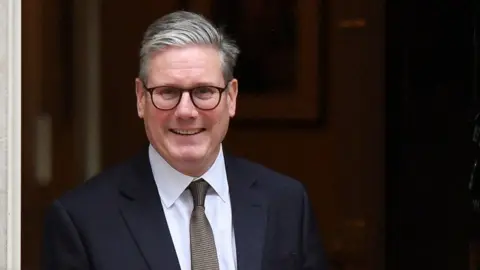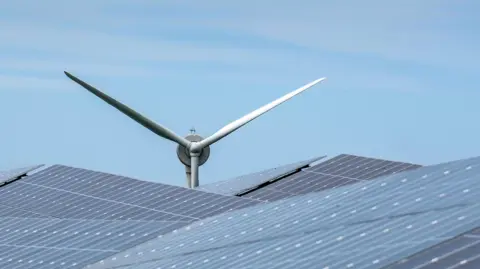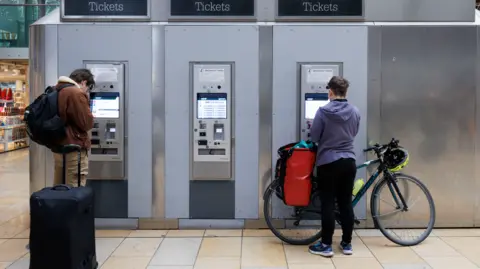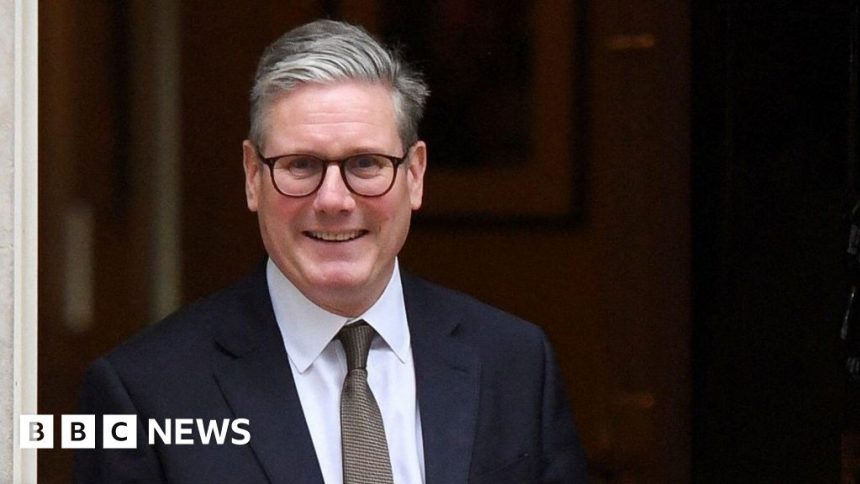What could be in Labour’s first King’s Speech?
 Reuters
ReutersThe new Labour government’s plans for the year ahead will be read out by King Charles in a speech to Parliament on Wednesday.
The speech is expected to outline around 35 draft laws ministers intend to introduce in the coming months, following Labour’s return to power.
Here is what could be included in their programme.
Illegal migration
The speech is expected to include legislation to give police more powers to tackle gangs that smuggle migrants across the English Channel in small boats.
Labour has scrapped the previous Conservative government’s scheme to send some asylum seekers to Rwanda, and has put renewed efforts to tackle smuggling gangs at the heart of its plans to tackle illegal migration.
Workers’ rights
Labour has promised to introduce legislation within 100 days of taking office to deliver new workers’ rights promised ahead of the election. Businesses and unions are expected to be consulted on the details.
The plans include banning the “exploitative” use of zero-hours contracts, and scrapping qualifying times for unfair dismissal, sick pay and parental leave rights.
A separate bill has been promised to extend the right to make equal pay claims under the Equality Act to ethnic minority workers and disabled people.
New energy company
Legislation is also expected to set up GB Energy, a new state-owned energy company to be based in Scotland.
The firm will invest in renewable energy projects, including emerging technologies like offshore floating wind farms and clean hydrogen.
Although it will not be a retail company that sells energy directly to consumers, Labour says it will generate power in its own right, as well as owning, managing and operating clean power projects alongside private firms.
Ministers have also promised legislation to set up a National Wealth Fund, which will invest £7.3bn over five years in infrastructure and green industry.
 Getty Images
Getty ImagesHousing and planning
Labour pledged to “immediately” ban so-called no fault evictions in its election manifesto, and criticised the previous Tory government for not doing so by failing to pass its Renters Reform Bill before the election.
It has also promised to extend a series of building safety rules for social tenants, known as Awaab’s Law, to private renters.
Labour has promised to put reforms to England’s planning system at the heart of the speech, although the number of new laws in this area has not been confirmed.
Railway nationalisation
The speech is also expected to reference legislation to deliver Labour’s pledge renationalise nearly all passenger rail services.
A law will be needed to set up a new body to oversee track and trains, called Great British Railways, and allow the government to take on responsibility for running services when existing franchise contracts expire.
 Getty Images
Getty ImagesCrime and punishment
A Crime and Policing Bill is expected to give police new powers to tackle anti-social behaviour, and introduce a new child exploitation offence in a bid to combat the use of children in “county lines” drug smuggling routes.
The bill is also expected to make assaulting shopworkers a specific crime, following a campaign by retailers.
Legislation is also expected to introduce a specific criminal offence to tackle drink spiking, which is currently prosecuted under more general offences.
Budget rules
Legislation to ensure the Office of Budget Responsibility has to provide forecasts for “significant changes to taxation or spending” will feature.
The party has also promised legislation to help HMRC tackle tax avoidance, revenue from which it has already earmarked to pay for NHS and school spending.
Mental health
The speech is expected to include a draft law which will reportedly aim to improve care for people with learning difficulties, and change rules on sectioning people.
Democracy and devolution
Labour has committed to legislation to transfer more powers to elected mayors in city regions in areas like housing, transport and planning.
A new law will also be required to fulfil its election pledge to give 16-year-olds the vote, although a timetable for this has not been confirmed. It has been reported that Labour also wants to introduce automatic registration.
The speech may also include a law to phase out remaining hereditary peers in the House of Lords. Plans to lower the retirement age to 80 will reportedly be introduced later in the Parliament, after a consultation.
Education
The speech will also reportedly include a draft law forcing councils in England to maintain registers of children not educated full-time in school, an idea Labour supported whilst in opposition.
The previous government supported a private member’s bill in this area from Tory Flick Drummond, who lost her seat at the election, but it did not progress beyond its initial stage in Parliament.
Online safety
In its election manifesto Labour said it would “build on” the previous government’s Online Safety Act, including by giving coroners more powers to access information held by tech firms after the death of a child.
It follows campaigning by the family of Molly Russell, who took her own life aged 14 in 2017 after being exposed to harmful content online.
An artificial intelligence bill is expected to ban sexually explicit deepfakes, and introduce new rules for the “most powerful AI models”.
There are reports the speech will also feature a cyber security bill, designed to protect critical infrastructure from attackers.
Hillsborough law
Labour has promised to introduce a legal “duty of candour” on public servants via a ‘Hillsborough Law’, a reference to the 1989 disaster at which 97 Liverpool fans died.
The previous government stopped short of introducing a new law in this area, instead making various commitments in a “charter”.
What about existing bills?
A number of the previous government’s bills that were dropped due to the election had been supported by Labour and could find themselves back on the legislative menu, either in a similar or amended form.
The party’s manifesto committed to bringing back bills to set up a football regulator and introduce a gradual ban on smoking.
It has also promised to enact Martyn’s law, named after a victim of the 2017 Manchester Arena attack, which would force large venues to put in place procedures to deal with the threat of terrorism.
The previous government had published a draft bill, but it was not passed ahead of Parliament being shut down before the election.






